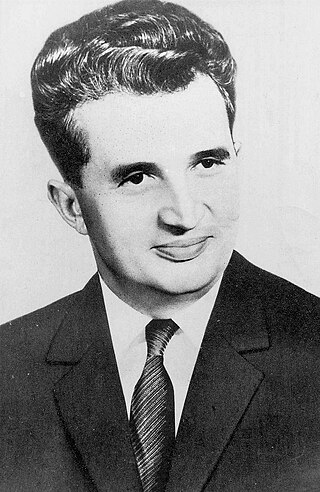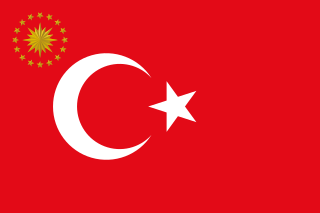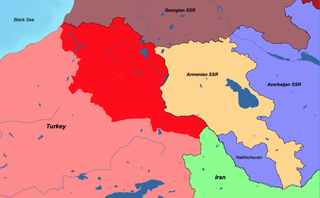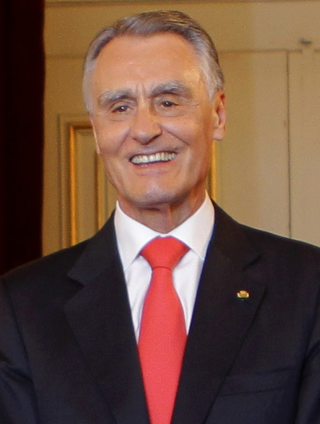
Nicolae Ceaușescu was a Romanian communist politician and dictator. He was the general secretary of the Romanian Communist Party from 1965 to 1989, and the second and last Communist leader of Romania. He was also the country's head of state from 1967, serving as President of the State Council and from 1974 concurrently as President of the Republic, until his overthrow and execution in the Romanian Revolution in December 1989, part of a series of anti-Communist uprisings in Eastern Europe that year.
In politics, a national assembly is either a unicameral legislature, the lower house of a bicameral legislature, or both houses of a bicameral legislature together. In the English language it generally means "an assembly composed of the representatives of the nation." The population base represented by this name is manifestly the nation as a whole, as opposed to a geographically select population, such as that represented by a provincial assembly. The powers of a National Assembly vary according to the type of government. It may possess all the powers of government, generally governing by committee, or it may function solely within the legislative branch of the government.

The president of Turkey, officially the president of the Republic of Türkiye, is the head of state and head of government of Turkey. The president directs the executive branch of the national government and is the commander-in-chief of the Turkish military. The president also heads the National Security Council.
Unicameralism is a type of legislature, which consists of one house or assembly, that legislates and votes as one.

A communist state, also known as a Marxist–Leninist state, is a one-party state that is administered and governed by a communist party guided by Marxism–Leninism. Marxism–Leninism was the state ideology of the Soviet Union, the Comintern after Bolshevisation and the communist states within the Comecon, the Eastern Bloc and the Warsaw Pact. Marxism–Leninism currently still remains the ideology of a few parties around the world. After its peak when many communist states were established, the Revolutions of 1989 brought down most of the communist states, however, it is still the official ideology of the ruling parties of China, Cuba, Laos, and Vietnam. During most of the 20th century, before the Revolutions of 1989, around one-third of the world's population lived under communist states.
A constitutional amendment is a modification of the constitution of a polity, organization or other type of entity. Amendments are often interwoven into the relevant sections of an existing constitution, directly altering the text. Conversely, they can be appended to the constitution as supplemental additions, thus changing the frame of government without altering the existing text of the document.
People's Assembly may refer to:

The Grand National Assembly of Turkey, usually referred to simply as the TBMM or Parliament, is the unicameral Turkish legislature. It is the sole body given the legislative prerogatives by the Turkish Constitution. It was founded in Ankara on 23 April 1920 in the midst of the National Campaign. This constitution had founded its pre-government known as 1st Executive Ministers of Turkey in May 1920. The parliament was fundamental in the efforts of Mareşal Mustafa Kemal Atatürk, 1st President of the Republic of Turkey, and his colleagues to found a new state out of the remnants of the Ottoman Empire.
A rubber stamp, as a political metaphor, is a person or institution with considerable de jure power but little de facto power — one that rarely or never disagrees with more powerful organizations. Historian Edward S. Ellis called this type of legislature a toy parliament.
State Council may refer to:

Hans-Gert Pöttering is a German lawyer, historian and conservative politician, who served as President of the European Parliament from January 2007 to July 2009 and as Chairman of the CDU-affiliated Konrad Adenauer Foundation from 2010 to 2017.
A parliamentary group, parliamentary party, or parliamentary caucus is a group consisting of some members of the same political party or electoral fusion of parties in a legislative assembly such as a parliament or a city council.

The Treaty of Kars was a treaty that established the borders between Turkey and the three Transcaucasian republics of the Soviet Union, which are now the independent republics of Armenia, Georgia and Azerbaijan. The treaty was signed in the city of Kars on 13 October 1921.
This electoral calendar 2007 lists the national/federal direct elections held in 2007 in the de jure and de facto sovereign states and their dependent territories. Referendums are included, although they are not elections. By-elections are not included.

The Parliament of Romania is the national bicameral legislature of Romania, consisting of the Chamber of Deputies and the Senate. It meets at the Palace of the Parliament in Bucharest, the capital of the country.

The Great National Assembly was the legislature of the Socialist Republic of Romania. After the overthrow of Communism in Romania in December 1989, the Great National Assembly was dissolved by decree of the National Salvation Front (FSN) and eventually replaced by the bicameral parliament, made up of the Chamber of Deputies and the Senate.
The legislatures of communist states included:

Aníbal António Cavaco Silva, GCC, GColL, GColIH is a Portuguese economist who served as the 19th president of Portugal, in office from 9 March 2006 to 9 March 2016. He had been previously prime minister of Portugal from 6 November 1985 to 28 October 1995. His 10-year tenure was the longest of any prime minister since António de Oliveira Salazar, and he was the first Portuguese prime minister to win an absolute parliamentary majority under the current constitutional system. He is best known for leading Portugal into the European Union.

The National Assembly Building (Slovene: Zgradba Državnega zbora, also colloquially the Parliament in Ljubljana, the capital of Slovenia, is a modernist palace housing the legislature of Slovenia. Built between 1954 and 1959 by the architect Vinko Glanz, it is a three-storey building with an area of 2,200 m2. It is located on the Republic Square in the center of Ljubljana. Annual visitor numbers are around 13,000.

The Independence Day is the national day of Moldova commemorating the adoption of the Declaration of Independence from the Soviet Union on 27 August 1991.










